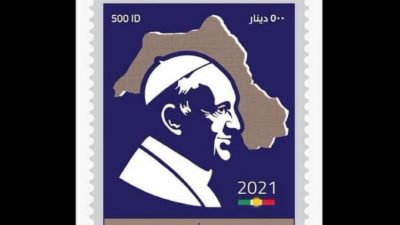Pope Stamp Showing ‘Greater Kurdistan’ Causes Uproar in Iraq, Iran, and Turkey

All Global Research articles can be read in 27 languages by activating the “Translate Website” drop down menu on the top banner of our home page (Desktop version).
***
A controversial attempt to mark Pope Francis‘s March 7 visit to Iraqi Kurdistan with a commemorative postage stamp has stoked regional tensions, prompting irate reactions from Turkey and Iran.
The stamp portrayed Pope Francis partially superimposed on a map of territory claimed by Kurdish nationalists as “Greater Kurdistan” – a contested area that includes Iraqi cities such as Kirkuk and Nineveh, as well as large swathes of southeastern Turkey and western Iran.
The circulation of the design on the Internet was met with condemnation, especially from Turkey and Iran. The Turkish Foreign Ministry called on Kurdish regional authority to rectify the “error”.
“Certain presumptious authorties in KRG [the Kurdistan Regional Government] dared to abuse the mentioned visit to express their unrealistic aspirations against the territorial integrity of Iraq’s neighbouring countries,” a statement from the Turkish foreign ministry said.
“KRG authorities are in the best position to remember the disappointing outcomes of such deceitful aims,” the Turkish statement warned ominously
Iran characterised the publication of the stamp design as an “ unfriendly action.”
“What has been published by the Kurdistan Regional Government is against international laws and principles,” Iranian Foreign Ministry spokesman Saeed Khatibzadeh was quoted by official news agency IRNA as saying.
KRG authorities responded with a statement saying the stamps were unofficial, having been presented by artists and designers rather than by any official body.
Hatem Al-Taie, a spokesman for the Arab Council in Kirkuk, said in a press statement on Friday that the stamps were “separatist”, adding that Kirkuk, a city retaken by Iraqi central government security forces from Kurdish peshmerga fighters in 2017, was not part of Kurdistan.
Kirkuk is a diverse city with an ethnically mixed population of Arabs, Kurds, Turkmen, and Assyrians.
However, many Iraqi Kurds consider it the “capital” of the Kurdistan Region, which is currently administered from Erbil.
Al-Taie added that the Kurdistan region was part of the Iraqi state and that the issuing of any postage stamp must be done through the Ministry of Transport.
Niyazi Mimaroglu, the leader of the Turkmen Front and a former member of the Iraqi parliament, accused the Kurdistan Regional Government of having “promoted such a map for years.”
During a televised interview he said that “the publication of the postage stamp was not spontaneous, but planned.” He called on the Iraqi parliament to investigate and “not be silent about this sensitive issue.”
However, KRG spokesman Gutiar Adel said the stamp designs had not been approved by Kurdish authorities.
“Artists have submitted samples of proposed stamp designs to be printed on the occasion of the Pope’s visit to Iraq,” he said in a statement. “So far, none of these models have been approved.”
A member of the Kurdistan Democratic Party, the governing party in the Iraqi Kurdistan Region, confirmed in a phone call to The New Arab’s Arabic service that the stamps “are usually made as part of a design competition for artists and amateurs and are later approved by the government in Erbil.”
However, he said the stamps had never been made official. “This is just an excuse to persecute the Erbil government,” he said.
*
Note to readers: please click the share buttons above or below. Forward this article to your email lists. Crosspost on your blog site, internet forums. etc.
Featured image: The stamp design caused outrage in Iran and Turkey [Getty]

